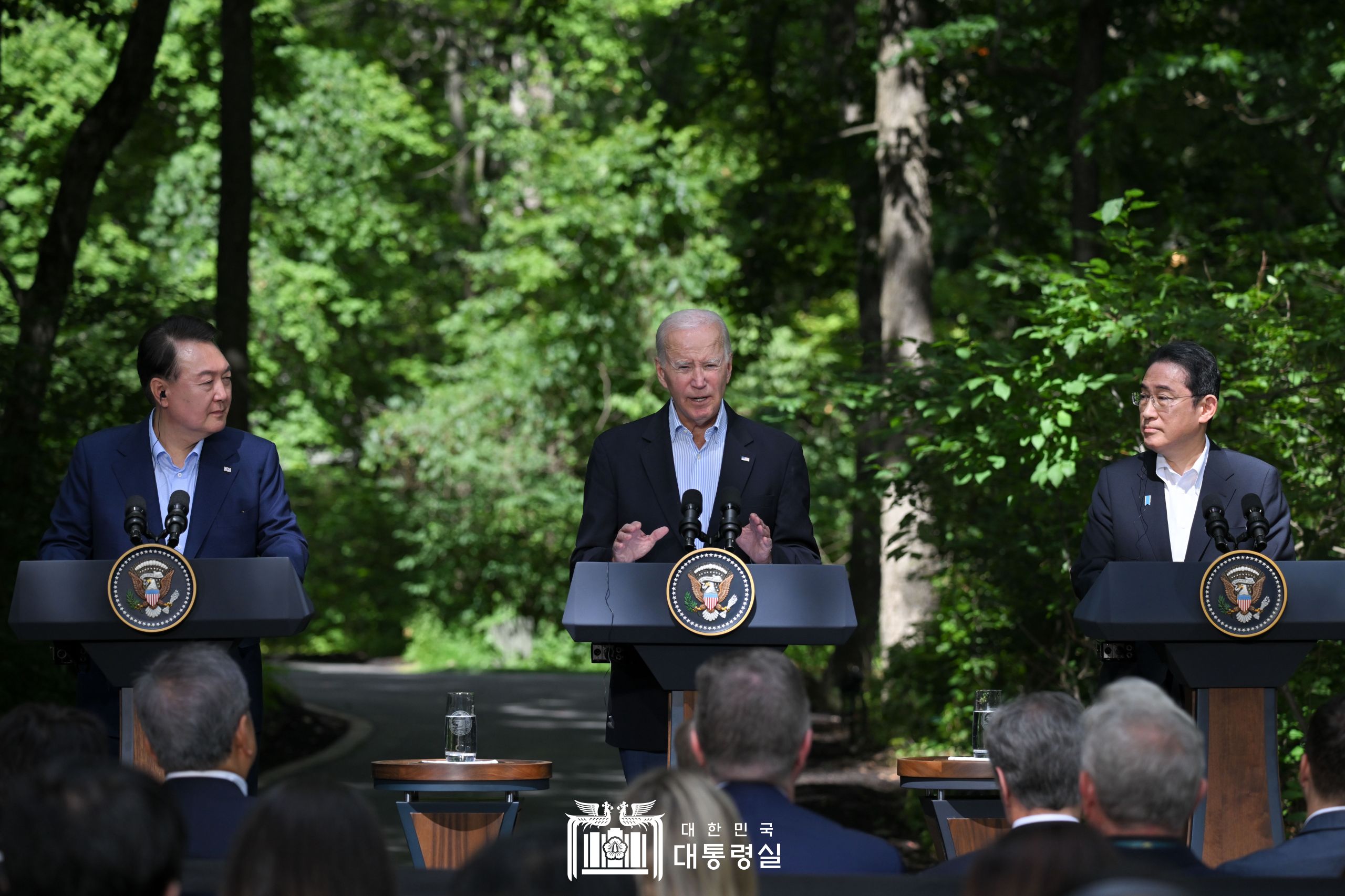US, South Korea, and Japan agree to increase defense, economic cooperation at summit

President Joe Biden speaks during a joint press conference with South Korea's President Yoon Suk Yeol and Japan's Prime Minister Fumio Kishida at Camp David, Maryland, on Aug. 18. OFFICE OF THE PRESIDENT OF THE REPUBLIC OF KOREA/Handout
Aug. 21 (ZFJ) — President Joe Biden, South Korea’s President Yoon Suk Yeol, and Japan’s Prime Minister Fumio Kishida agreed to increase defense and economic cooperation among their countries at a Camp David summit on Friday, Aug. 18.
This meeting is the first-ever standalone summit between the leaders of Japan, South Korea, and the United States.
Japan and South Korea continue to have disputes over former Imperial Japan’s colonial rule from 1910-1945. The U.S. has been keen to improve their relations because of heightened tensions with China and North Korea.
“This is a moment that requires unity and coordinated action from true partners, and it is a moment we intend to meet, together,” said the three leaders in a joint summit statement.
REGIONAL SECURITY ISSUES
The three leaders pledged to increase communication among their nations regarding defense issues in the Indo-Pacific.
“We commit our governments to consult trilaterally with each other, in an expeditious manner, to coordinate our responses to regional challenges, provocations, and threats affecting our collective interests and security,” they said.
Addressing regional security threats, the leaders condemned China’s maritime claims in the South China Sea. They also criticized China’s attempts to pressure Taiwan to accept Chinese sovereignty by using military exercises.
“Regarding the publicly announced position of each of our countries regarding the dangerous and aggressive behavior supporting unlawful maritime claims that we have recently witnessed by the People’s Republic of China (PRC) in the South China Sea, we strongly oppose any unilateral attempts to change the status quo in the waters of the Indo-Pacific,” they said.
Chinese foreign ministry spokesperson Wang Wenbin denounced the leaders’ statement, asserting “indisputable sovereignty” over South China Sea islands and calling the U.S. the “biggest threat and challenge to regional peace and stability.” He also said in his press briefing that “the Taiwan question is purely China’s internal affair.”
The leaders also criticized North Korea’s continuing ballistic missile tests. Several missiles have landed near Japan, including in its exclusive economic zone (an area of ocean beyond territorial sea where a country has jurisdiction over natural resources).
“We strongly condemn the DPRK’s unprecedented number of ballistic missile launches, including multiple intercontinental ballistic missile (ICBM) launches and conventional military actions that pose a grave threat to peace and security on the Korean Peninsula and beyond,” the leaders said, using North Korea’s official name, the Democratic People’s Republic of Korea.
They also announced a trilateral working group to counter North Korea’s sponsorship of cybercrime to fund missile programs and called for the country to release its remaining detainees. U.S. soldier Travis King crossed into North Korea on July 18 and has remained detained there since.
DEFENSE COOPERATION
The three leaders announced their intention to hold annual trilateral military exercises to test the countries’ coordination. They also committed to improve real-time sharing of missile warning data on North Korea.
The countries have previously held ballistic missile defense and anti-submarine warfare drills, targeted at defending against North Korea.
The U.S. has mutual defense treaties with Japan and South Korea that commit it to provide military aid in the event of attack.
China is displeased to hear of further military exercises in the Indo-Pacific.
“The U.S., together with its allies, frequently conducted military exercises and close-in reconnaissance in waters around China, including the South China Sea, to flex muscles and intensify tensions in the region,” said Chinese foreign ministry spokesperson Wang Wenbin about the Camp David summit at his regular press briefing.
ECONOMIC COOPERATION
The leaders said they would cooperate on supply chain resilience for critical products and materials, such as semiconductors, as well as research into clean energy and artificial intelligence, among other fields.
They also said they will work together on export controls for military-related technology, an open radio access network, and space security.
SIDE MEETINGS
Biden and Yoon discussed the North Korean nuclear and ballistic missile threat and extended deterrence efforts under the Washington Declaration, a reaffirmation from April of their mutual defense commitments.
Biden and Kishida discussed China’s activities in the South China Sea and Taiwan Strait, as well as plans to undertake a Glide Phase Interceptor cooperative development program to counter hypersonic missiles.
Kishida and Yoon discussed expanding economic interactions and plans to communicate more frequently. They also recognized that both countries will work together as non-permanent U.N. Security Council members next year.
MOVING FORWARD
Yoon and Kishida have been seeking to improve their relations. They have met each other three times this year before the Camp David summit.
In early March, South Korea announced a plan for its companies to compensate South Koreans who were compelled to be forced laborers under Imperial Japan’s colonial rule of Korea.
While visiting Seoul in early May in a Japanese leader’s first visit to the capital in 12 years, Kishida expressed compassion for South Koreans’ suffering under Japanese colonial rule.
At the Group of Seven summit in late May, Yoon praised Kishida for his efforts to improve relations, and they visited the Hiroshima Memorial Peace Park together.
At the Camp David summit, the three leaders said they would continue regular annual diplomatic meetings, such as a defense officials’ meeting and a Trilateral Indo-Pacific Dialogue (on policy for the region).
References
- The White House - Remarks by President Biden, President Yoon Suk Yeol of the Republic of Korea, and Prime Minister Kishida Fumio of Japan Before Trilateral Meeting | Camp David, MD - https://www.whitehouse.gov/briefing-room/speeches-remarks/2023/08/18/remarks-by-president-biden-president-yoon-suk-yeol-of-the-republic-of-korea-and-prime-minister-kishida-fumio-of-japan-before-trilateral-meeting-camp-david-md/ (ARCHIVE)
- The White House - The Spirit of Camp David: Joint Statement of Japan, the Republic of Korea, and the United States - https://www.whitehouse.gov/briefing-room/statements-releases/2023/08/18/the-spirit-of-camp-david-joint-statement-of-japan-the-republic-of-korea-and-the-united-states/ (ARCHIVE)
- The White House - Camp David Principles - https://www.whitehouse.gov/briefing-room/statements-releases/2023/08/18/camp-david-principles/ (ARCHIVE)
- The White House - Commitment to Consult - https://www.whitehouse.gov/briefing-room/statements-releases/2023/08/18/commitment-to-consult/ (ARCHIVE)
- The White House - FACT SHEET: The Trilateral Leaders’ Summit at Camp David - https://www.whitehouse.gov/briefing-room/statements-releases/2023/08/18/fact-sheet-the-trilateral-leaders-summit-at-camp-david/ (ARCHIVE)
- The White House - Readout of President Biden’s Meeting with President Yoon Suk Yeol of the Republic of Korea - https://www.whitehouse.gov/briefing-room/statements-releases/2023/08/18/readout-of-president-bidens-meeting-with-president-yoon-suk-yeol-of-the-republic-of-korea/ (ARCHIVE)
- The White House - Readout of President Biden’s Meeting with Prime Minister Kishida of Japan - https://www.whitehouse.gov/briefing-room/statements-releases/2023/08/18/readout-of-president-bidens-meeting-with-prime-minister-kishida-of-japan-4/ (ARCHIVE)
- Prime Minister’s Office of Japan - Japan-U.S. Summit Meeting (Summary) - https://japan.kantei.go.jp/101_kishida/diplomatic/202308/18usa.html (ARCHIVE)
- Prime Minister’s Office of Japan - Japan-ROK Summit Meeting (Summary) - https://japan.kantei.go.jp/101_kishida/diplomatic/202308/18korea.html (ARCHIVE)
- Foreign Ministry of the People’s Republic of China - Foreign Ministry Spokesperson Wang Wenbin’s Regular Press Conference on August 21, 2023 - https://www.fmprc.gov.cn/eng/xwfw_665399/s2510_665401/2511_665403/202308/t20230821_11129753.html (ARCHIVE)
